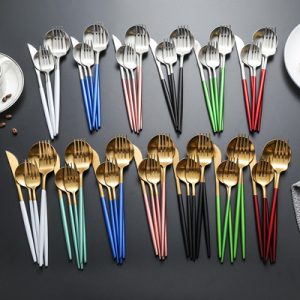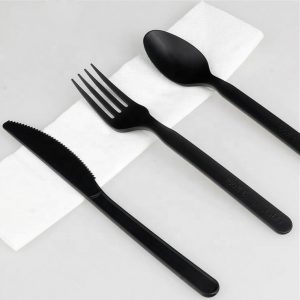Choosing eco-friendly and sustainable flatware options is a great way to reduce your environmental impact while still enjoying stylish and functional utensils. Here are some eco-friendly flatware choices and considerations:
- Bamboo Flatware:
- Bamboo is a renewable resource that grows quickly and doesn’t require pesticides or fertilizers.
- Bamboo flatware is lightweight, durable, and biodegradable.
- Look for bamboo utensils finished with natural oils for added durability.
- Stainless Steel:
- Opt for high-quality stainless steel flatware that will last a long time, reducing the need for replacements.
- Choose 18/10 stainless steel, which contains 18% chromium and 10% nickel for greater corrosion resistance.
- Recycled Metal:
- Look for flatware made from recycled metals, which reduces the demand for new raw materials.
- Some brands offer flatware crafted from reclaimed or upcycled metals.
- Wooden Handles:
- Flatware with wooden handles adds a touch of warmth and sustainability to your table.
- Choose utensils made from sustainably harvested or certified wood.
- Titanium Coating:
- Some companies offer titanium-coated flatware that is more durable and scratch-resistant than traditional coatings. This prolongs the lifespan of the utensils.
- Reusable Travel Utensils:
- Invest in a set of reusable travel utensils made from sustainable materials like bamboo or stainless steel. Carry them with you to avoid using disposable utensils while on the go.
- Avoid Single-Use Plastics:
- Steer clear of single-use plastic cutlery and opt for reusable alternatives. Many disposable plastic utensils end up in landfills and oceans.
- Buy from Sustainable Brands:
- Look for brands that prioritize sustainable practices, use eco-friendly materials, and follow ethical production processes.
- Local Artisans:
- Support local artisans who create handmade, sustainable flatware from natural or reclaimed materials.
- Care and Maintenance:
- Properly care for your flatware to extend its lifespan, reducing the need for replacements.
- Second-Hand and Vintage:
- Consider purchasing second-hand or vintage flatware from thrift stores, antique shops, or online platforms. This prevents the need for new production.
- Minimal Packaging:
- Choose flatware that comes with minimal or recyclable packaging to reduce waste.
- Certifications:
- Look for certifications such as Fair Trade or Forest Stewardship Council (FSC) for wooden handles to ensure ethical and sustainable practices.
- DIY and Upcycling:
- Get creative and upcycle old or damaged flatware into new pieces or decorative items.
By making conscious choices and selecting eco-friendly flatware, you contribute to the reduction of plastic waste and the preservation of natural resources, all while enjoying stylish and functional utensils for your meals.
















